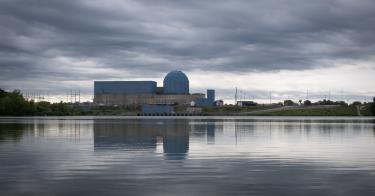Consumption of electricity is rising in the United States, straining our existing power grids. Fortunately, nuclear energy is positioned to meet this additional demand.
Despite decades of overzealous regulators, ill-informed politicians, distorting subsidies, and numerous other unworkable policies, nuclear energy today provides almost twenty percent of the nation’s electricity with ninety-four nuclear power reactors.
This should surprise no one. Nuclear energy is extraordinarily safe. No one has been sickened by radiological exposure at an American commercial nuclear plant.
No energy source is more environmentally friendly. Nuclear energy emits virtually nothing into the atmosphere, and it uses little land per unit of energy produced.
Most important, nuclear energy provides reliable baseload electricity, precisely what a modern, twenty-four/seven industrial economy requires.
However, reactors need fuel, and America’s production is low.
Commercial reactors in the United States use uranium fuel. Though natural uranium is available, it must be processed before use.
>>> Trump’s Executive Orders Are the First Steps in a Nuclear Revolution
That is because the usable isotope for fueling commercial American reactors is too diluted in its natural state to sustain fission. The process of increasing the concentration of this isotope is called enrichment.
America used to lead the world in enriching commercial uranium, but now it imports around seventy-two percent of its enriched uranium. Much of this comes from friendly countries like France, the United Kingdom, and the Netherlands, but the problem is that over a quarter comes from Russia.
In response, Congress passed the Prohibiting Russian Uranium Imports Act last year. While the law ostensibly bans Russian uranium fuel imports, it also created waivers that allow Russian uranium to flow into the country until 2028.
While this gives the nuclear industry time to replace its Russian supply, it also reduces the urgency to find alternatives. It also makes it easier to reverse the ban should the geopolitical landscape change.
Nonetheless, firms are responding. America’s leading commercial domestic enricher, for example, has already committed to expanding its capacity, and new firms are entering the market.
This is promising, but private companies are being asked to risk capital for a product that has long been manipulated by incoherent federal policies.
Unfortunately, politicians have chosen to mitigate risks by offering subsidies, which have three major problems.
First, they allow recipient firms that could not otherwise be successful to continue to consume resources. The other side of that coin is that they give taxpayer money to firms that would be successful anyway.
Second, they mask the underlying problems that cause the alleged need for subsidies.
Third, subsidies make America less competitive by rewarding firms based on political preference rather than economic merit. Subsidies rarely work because they perpetuate mediocrity.
The best solution—getting rid of all subsidies immediately—is unlikely. What, then, can be done?
First and foremost, Congress and the president must not weaken the 2024 ban on Russian uranium fuel imports. Second, the availability of waivers should not be extended, and waivers should only be issued transparently when no alternative exists.
Expanding and building domestic commercial uranium enrichment facilities is costly and requires long-term market certainty to justify the investment. Reversing or weakening the ban will undermine that certainty.
Third, enrichment companies should be allowed to begin construction prior to receiving permits so long as it is done at their own financial risk. These companies are not reinventing the wheel, and uranium enrichment is a well-known, safe process.
Enrichment firms understand what is expected from regulators and can build accordingly. Allowing them to begin construction swiftly would allow operations to commence much sooner, once all permits are attained.
>>> Why American Energy Dominance Is a Strategic Imperative
Similarly, firms should be exempt from submitting additional environmental review work when building or expanding sites where enrichment is currently or has already taken place—saving time and money. These sites have already been considered safe for enrichment.
States should be authorized to take a larger role in regulating enrichment facilities. Natural uranium does not pose a significant radiological risk, and nothing akin to fission is taking place to produce dangerous byproducts.
Enrichment is an industrial activity that modifies the ratio of naturally occurring uranium isotopes in a volume of material. States that choose to oversee the activity should be allowed to do so.
Indeed, there is already precedent for states overseeing nuclear activities. Section 274 b of the Atomic Energy Act governs the conditions for states to take on additional responsibilities. That authority should be expanded to include enrichment.
Lastly, it should be easier for reactor technologies that use alternative fuels like natural uranium and thorium to develop commercially.
Getting rid of subsidies and establishing technology-neutral and less arduous regulatory regimes would invite greater competition and more commercial diversity.
America has the technology, capital, and skills to quickly expand its enrichment capacity. All Washington needs to do is get out of the way.
This piece originally appeared in The National Interest




